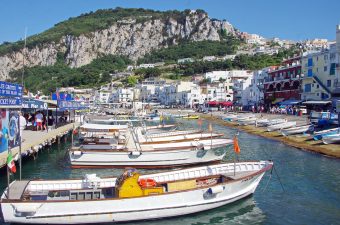
If you find yourself on the island of Capri, you’d better not have a plastic fork stuck in your bag, or else you might get a €500 fine. The new ruling, effective May 15, states that no more single-use plastics are allowed on the island, unless they’re made of biodegradable plastic. They can neither be sold by local shopkeepers, nor brought onto the island by visitors.
It is part of a broader effort to combat marine plastic pollution. A recent investigation found that the water separating Capri from the mainland had four times more plastic waste in it than other marine areas around Italy. This has spurred the local government to action, as it does not want its stunning island’s reputation to be sullied by plastic.
Mayor Gianni de Martino told EFE, “We have a very big problem and we have to contribute (to finding a solution). We all have heard about the famous plastic island which exists in the sea… [This new rule will reduce] the pollution problem, improve the selective collection of residue and obviously contribute to taking care of the environment.”
The rule is no different from the one that will be implemented throughout the European Union in 2021, except that it’s taking effect 18 months earlier.
Furthermore, a new regulation has been approved that allows fishermen to collect plastic waste that gets caught in their nets. Previously, “they were forced to dispose of it in order to avoid the charge of illegally transporting residues on land.”
I’m all in favor of Capri’s anti-plastic rule, but the ‘biodegradable’ loophole is an odd one, since biodegradable plastics are not a solution to the waste problem. Studies have proven that so-called biodegradable or compostable plastics do not truly break down and often remain in the natural environment for as long as conventional plastics. They require specific conditions to degrade, such as heat and sunlight; and even when they do fall apart, scientists say further research is needed to determine where the pieces go and what effect they have.
A far better and more sustainable solution would be to ban all plastic single-use disposables and focus rather on reusables. Still, I suppose we must celebrate the little wins, and Capri’s eagerness to get ahead of the curve on this issue – and its understanding of the implications if it does not – is hopeful.
Author: Katherine Martinko
Source: Tree Hugger



